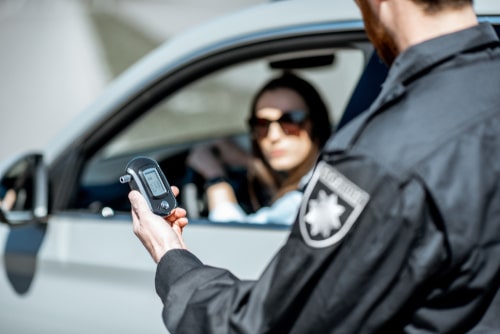The police suspect that you have been drinking, so you have been pulled over by them. Or maybe you have been at a DUI stop in Indiana. It is to be expected that you received a rap on your window and an officer asked you for your license and registration. A police officer then surprises you by asking you to search your vehicle. Do you have to allow the vehicle to be searched? It depends on the situation or on what you mean.
According to the Indiana Department of Transportation, 83 people died in drunk driving accidents in 2018. Alcohol-impaired crashes accounted for 8 percent of all fatal crashes, 3 percent of nonfatal crashes, and less than 2 percent of property damage accidents that same year.
If you would like to know more information about if you can get trouble if you blow through a DUI checkpoint, view this page.
Focus On the Fourth Amendment When Being Searched by The Police:
The utmost protection is provided to you by the Fourth Amendment to the United States Constitution against “unreasonable searches and seizures” and that includes your vehicle. As a result, you may not be required to allow the police to search your car in many cases. If you want to end the issue, you can courteously remind the officer that you are not required to participate in the search.
Nonetheless, there are several circumstances under which police are authorized to search your vehicle. These circumstances should be clearly understood, as they can be helpful.
Learning About Lawful Police Searches by an Indiana DUI Attorney:
You should not be surprised to learn that an officer has a right to search your car if they have a warrant. The police will be granted a search warrant by the judge if they have evidence that strongly suggests the commission of a crime is imminent or has already occurred.
A warrant is not required in all lawful searches conducted by the police. A search of your vehicle may also be permitted in the following circumstances:
They Have a Justified Reason Due to Their “Plain View”:
It is permissible for officers to search without a warrant if evidence of the crime is in plain view. Although the word ‘view’ implies the officer must have visual access to the evidence in question. The concept of ‘plain view’ also applies to the senses of hearing and smell. Before you can be held accountable for evidence collected in the process of search, an officer who used a plain view just for the search will need to prove to a judge that the search was lawful.
They Need to Protect Themselves:
Officers can search your vehicle if they believe they are in danger. A search for any hidden weapon in your car is one of the most common instances in this case.
They Are Lawfully Arresting You:
In a situation where the police have probable cause to believe that you have committed a crime, they have the authority to search your car. If they are arresting you for the crime for which you are being held, they must reasonably believe that they have evidence related to that crime.
They Have Impounded Your Car:
A car being searched by the police at the DUI stop in Indiana is allowed to be searched if the vehicle has been impounded. However, the police cannot impound a car purely to search it.
You Have Given Your Consent:
If you say yes, a police officer is authorized to search your car. Remember our previous scenario where an officer asked you to allow them to search your car? You can decline this request under the Fourth Amendment to the U.S. Constitution, which is essential to keep in mind.
If you believe that none of the conditions listed above apply, you should clearly state that you do not consent to your vehicle being searched. Furthermore, you should contact an attorney and refrain from answering questions from the police until you have consulted with your attorney. You must not interfere with officers’ searches of your vehicle.
Your attorney will aggressively argue this point for you if the search turned out to be unlawful. However, if your attorney does not win this point on your behalf, the evidence may deem to be admissible in court.
Indiana DUI Lawyers Are Ready to Defend You; Contact Our Flagstaff Criminal Attorney Today:
When you have been arrested for DUI – and if your car was searched under questionable circumstances, a DUI lawyer in Indiana will be prepared to help you. Get in touch with us today if that is the case.








